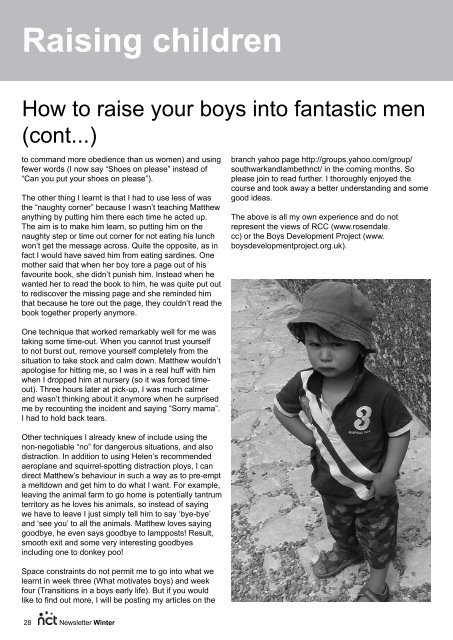Autumn 2011 - Mandy Mazliah
Autumn 2011 - Mandy Mazliah
Autumn 2011 - Mandy Mazliah
You also want an ePaper? Increase the reach of your titles
YUMPU automatically turns print PDFs into web optimized ePapers that Google loves.
Raising children<br />
How to raise your boys into fantastic men<br />
(cont...)<br />
to command more obedience than us women) and using<br />
fewer words (I now say “Shoes on please” instead of<br />
“Can you put your shoes on please”).<br />
The other thing I learnt is that I had to use less of was<br />
the “naughty corner” because I wasn’t teaching Matthew<br />
anything by putting him there each time he acted up.<br />
The aim is to make him learn, so putting him on the<br />
naughty step or time out corner for not eating his lunch<br />
won’t get the message across. Quite the opposite, as in<br />
fact I would have saved him from eating sardines. One<br />
mother said that when her boy tore a page out of his<br />
favourite book, she didn’t punish him. Instead when he<br />
wanted her to read the book to him, he was quite put out<br />
to rediscover the missing page and she reminded him<br />
that because he tore out the page, they couldn’t read the<br />
book together properly anymore.<br />
One technique that worked remarkably well for me was<br />
taking some time-out. When you cannot trust yourself<br />
to not burst out, remove yourself completely from the<br />
situation to take stock and calm down. Matthew wouldn’t<br />
apologise for hitting me, so I was in a real huff with him<br />
when I dropped him at nursery (so it was forced timeout).<br />
Three hours later at pick-up, I was much calmer<br />
and wasn’t thinking about it anymore when he surprised<br />
me by recounting the incident and saying “Sorry mama”.<br />
I had to hold back tears.<br />
Other techniques I already knew of include using the<br />
non-negotiable “no” for dangerous situations, and also<br />
distraction. In addition to using Helen’s recommended<br />
aeroplane and squirrel-spotting distraction ploys, I can<br />
direct Matthew’s behaviour in such a way as to pre-empt<br />
a meltdown and get him to do what I want. For example,<br />
leaving the animal farm to go home is potentially tantrum<br />
territory as he loves his animals, so instead of saying<br />
we have to leave I just simply tell him to say ‘bye-bye’<br />
and ‘see you’ to all the animals. Matthew loves saying<br />
goodbye, he even says goodbye to lampposts! Result,<br />
smooth exit and some very interesting goodbyes<br />
including one to donkey poo!<br />
Space constraints do not permit me to go into what we<br />
learnt in week three (What motivates boys) and week<br />
four (Transitions in a boys early life). But if you would<br />
like to find out more, I will be posting my articles on the<br />
branch yahoo page http://groups.yahoo.com/group/<br />
southwarkandlambethnct/ in the coming months. So<br />
please join to read further. I thoroughly enjoyed the<br />
course and took away a better understanding and some<br />
good ideas.<br />
The above is all my own experience and do not<br />
represent the views of RCC (www.rosendale.<br />
cc) or the Boys Development Project (www.<br />
boysdevelopmentproject.org.uk).<br />
28 Newsletter Winter





